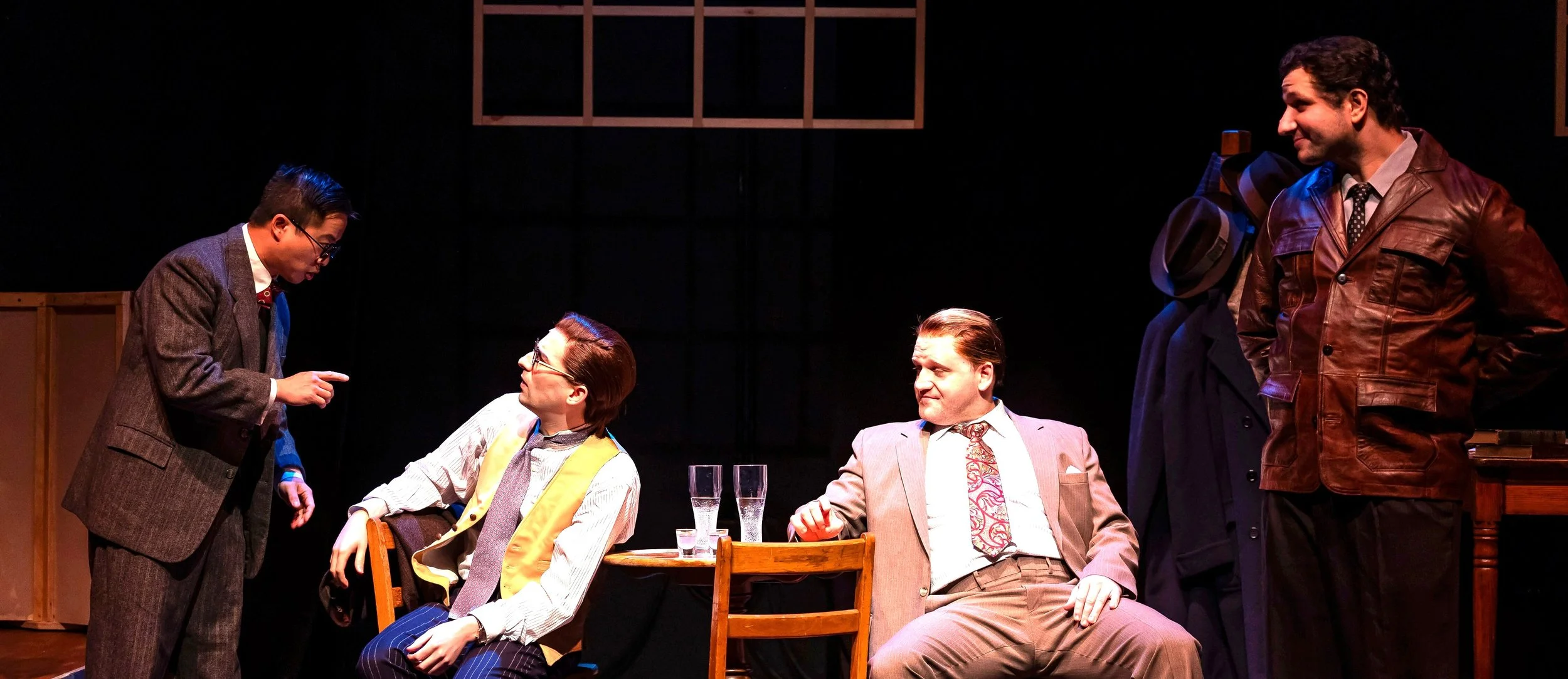When Frank Capra’s It’s a Wonderful Life premiered a few days before Christmas in 1946, New York Times reviewer Bosley Crowther was not exactly filled with glad tidings. “The weakness of this picture,” he bah-humbugged, “is the sentimentality of it—its illusory concept of life.” He observed that the small-town denizens represented in the film, “all resemble theatrical attitudes rather than average realities.” In a return engagement of Irish Repertory Theatre’s It’s a Wonderful Life! A Live Radio Play, Anthony E. Palermo’s adaptation of the film’s screenplay unapologetically leans into the sentimentality and accentuates the theatrical attitudes to deliver a sparkling and joyful Yuletide delight.
Polishing Shakespeare
Can one improve upon Shakespeare? That is the question. Or at least that is the question that propels the plot of Brian Dykstra’s Polishing Shakespeare. For more than 400 years, Shakespeare’s identity has been debated, challenged, and disputed, and his plays have been revised, reimagined, and rewritten. Yet it is only recently that the literary ethics of directly translating his works from early modern to present-day English have been thoroughly considered.
The Cherry Orchard
Upon the 1904 opening of The Cherry Orchard, directed by Konstantin Stanislavski, Anton Chekhov notoriously fumed, “Stanislavski has ruined my play!” The playwright envisioned his work as a comedy with elements of farce, a stark contrast to the tragic conception of the renowned Moscow Art Theatre director. One wonders what these two artistic giants would think of the current interpretation now playing at St. Ann’s Warehouse. Adapted and directed by Benedict Andrews, this Donmar Warehouse production from London is spare, farcical, interactive, and grooves to an indie-music beat. While purists may scoff at this cheeky approach to Chekhov, this is a Cherry Orchard for our times.
A Knock on the Roof
On a daily basis, news feeds and media broadcasts are saturated with reports, images, and updated statistics about the brutal destruction in Gaza. After a while, even when there is a pause in the attacks and counterattacks, the repeated and constant exposure can numb one’s emotional response and make it harder to feel empathy for those directly affected. Writer and performer Khawla Ibraheem’s A Knock on the Roof notably highlights the real human suffering caused by war, while also challenging audiences to contemplate how they would cope with such ever-present trauma.
Scarlett Dreams
In addition to introducing the word robot to the English language, Czech writer Karel Čapek’s 1920 sci-fi drama R.U.R. depicted a dystopian world in which scientifically manufactured laborers gradually eradicate humans. The play perfectly captured the anxieties of the burgeoning Machine Age and was a big hit on Broadway in 1922. S. Asher Gelman’s Scarlett Dreams attempts to tap into similar uneasiness as the former Information Age settles into the current Age of Intelligence. With the meteoric advancement and sudden ubiquity of artificial intelligence (AI), the play suggests that it may be just a matter of time when people will be controlled by digital avatars, and the difference between reality and virtual reality (VR) will become purely conjectural.
Merry Me
Hansol Jung’s irreverent new comedy Merry Me is a dramaturgical mash-up that borrows freely from Euripides’s Iphigenia in Aulis, William Wycherley’s The Country Wife, and Tony Kushner’s Angels in America. Along the way it also includes allusions to (naming just a few) poems by Sappho, Fifty Shades of Grey, and The L Word. The conceit is clever and ambitious, but the elements rarely cohere. To the credit of a hardworking and resourceful cast, though, there are some funny moments, but much of the merriment seems forced rather than breezily effortless.
Days of Wine and Roses
In Days of Wine and Roses, the new musical based on JP Miller’s 1958 teleplay and Blake Edwards’s 1962 Warner Bros. film, the central characters introduce themselves in song as “two people stranded at sea.” Even when offered lifelines, as the boozy, destructive duo often are, they respond like drowning victims, clawing and scratching, threatening to bring their rescuers down with them. With a book by Craig Lucas and a score by Adam Guettel, Days of Wine and Roses presents a searing and sobering portrait of the devastating costs of addiction.
Cat on a Hot Tin Roof
Last summer the Ruth Stage production of Tennessee Williams’s 1955 Pulitzer Prize–winning Cat on a Hot Tin Roof opened at Off-Broadway’s Theatre at St. Clement’s. The critical responses were uniformly mixed-to-negative, and OffOffOnline’s Charles Wright described it as a “lumbering version” of the play under Joe Rosario’s direction. Now in a “re-engagement,” as the publicity materials describe the current iteration, the production has been substantially recast, and there are a few directorial modifications. While this Cat 2.0 still lumbers, there is a noticeable improvement along with glimmers of fresh insight into the mendacious, caustic, and fiercely combative characters who populate Williams’s Mississippi Delta estate.
A Delicate Balance
Edward Albee’s 1966 Pulitzer Prize–winning A Delicate Balance begins in the evening and ends in the morning. Hidden terrors emerge and then suddenly disappear in a drama that could be titled Long Night’s Journey into Day. As one character says, “Darkness still frightens us,” and “when the daylight comes again . . . comes order with it.” In Jack Cummings III’s slyly off-kilter production, presented in partnership with Transport Group and the National Asian American Theatre Company, the play begins in total light and ends in complete darkness. The terrors do not dissipate at dawn but linger into a new day.
Under the Dragon’s Tail
On the lam criminals, a would-be king living as an exiled stoner, an untethered cosmonaut, and a pair of lovers sorting through the detritus of a terminated relationship—are the characters populating Isaac Byrne’s Under the Dragon’s Tail. Byrne also directs the quartet of one-acts that are not always in perfect harmony, but as a quadriptych, they intriguingly show the ways in which elements of mythology, metaphor, and symbolism can give order to the chaos of the contemporary world.
Belfast Girls
In the 1840s, famine devastated Ireland, and approximately 1 million people died during the period known as the Great Hunger (An Gorta Mór in Irish). Another 2 million emigrated from the comparatively small island nation, and as a result, by 1852, the country had lost approximately 25 percent of its total population. Jaki McCarrick’s Belfast Girls, currently running at Irish Repertory Theatre, examines the effect the famine had on women in particular and explores its devastating impact on the poorest of the poor in Ireland.
Which Way to the Stage
Anyone who has walked by a Broadway theater’s stage door after a show will immediately recognize the central characters of Ana Nogueira’s Which Way to the Stage. They are the ones clutching a copy of Playbill (usually protected in plastic) in one hand and waving a Sharpie in the other. As they wait for autographs, they fervently debate the most pressing issues of the day, such as who should play Mame in the next Broadway revival; which Glinda in Wicked even comes close to Kristin Chenoweth’s performance; and, for heaven’s sake, will Rob Marshall ever make Follies into a movie?
Bloom
Alfred Hitchcock famously described the basis of suspense as a situation in which there is a ticking time bomb under a table. The audience knows it is only a matter of minutes in which the bomb will explode, and they sit on the edge of their seats in anticipation of the outcome. Applying this principle, Marco Antonio Rodriguez initially establishes a veritable minefield in his new play Bloom, currently running at the IATI Theater. In the totalitarian world in which the play is set, a mother has been ordered to kill her son, and if she does not do so within precisely one hour, unimaginable horrors will follow.
Tambo & Bones
When the lights came up at the end of Dave Harris’s disorienting Tambo & Bones, my companion asked me, “Am I real?” The satirical play teasingly calls attention to the artifice of theater and performance while emphasizing “fake-ass” set pieces, “fake-ass” backstories, and “fake-ass” racial identities. Even the composition of the audience at Playwrights Horizons seems to be fabricated. I wasn’t so sure I could give my friend an answer.
Selling Kabul
Selling Kabul, Sylvia Khoury’s play currently running at Playwrights Horizons, is significant and timely. Although written in 2015, the drama’s focus on the collateral damage of the pullout of U.S. forces in Afghanistan is even more urgent in light of President Biden’s complete withdrawal three months ago. Significant, timely, and urgent do not, however, necessarily make for great theater. To its credit, Selling Kabul does not minimize the political and ideological concerns, but it offers an impressively riveting, suspenseful, and deeply moving portrayal of four complex individuals caught up in the sweep of national turmoil.
Chekhov/Tolstoy: Love Stories
The Mint Theater Company has once again returned to excavating the long-forgotten dramatic works of Miles Malleson, a 20th-century British actor, playwright, and screenwriter. Chekhov/Tolstoy: Love Stories presents a pair of one-act dramas based on short stories by the Russian literary giants and adapted by Malleson. Audience members with passing familiarity of works by Anton Chekhov and Leo Tolstoy will surely not expect to see a rom-com double bill, and yet the plays reflect the authors’ depths of compassion and devotion to social and spiritual uplift.
Stew
Nearly two years ago Jackie Sibblies Drury’s Fairview, which revolves around a high-stakes family dinner party, opened at Soho Rep’s theater on Walker Street. The devastating play compelled audiences to examine their attitudes toward race and class in the United States and went on to win the Pulitzer Prize. Currently playing in the same theater (presented not by Soho Rep but by Page 73), Zora Howard’s Stew also centers on the stressful preparation of a meal while addressing issues confronting African Americans, particularly women, in the 21st century. Stew does not have the raw power of its predecessor, but in its assault on the senses, the play is ultimately unnerving.
BrandoCapote
The setting of BrandoCapote, the multimedia performance piece currently playing at the Tank, is a room at the Miyako Hotel in Kyoto, Japan. It is the location in which Truman Capote interviewed Marlon Brando in 1957 when the star was filming Sayonara. The play hopscotches from 1957 to 2004, the year Brando died, and the hotel also represents, as the program explains, purgatory.
Round Table
Liba Vaynberg’s Round Table is a small play with huge aspirations. Focusing on a pair of nerdy lovers who meet through an online dating app, Vaynberg’s work is at heart a sentimental and sweet romantic comedy. Interspersed throughout, however, are scenes inspired by the legend of King Arthur as well as monologues that break the fourth wall to address heady quandaries about unrequited love, self-idealization, and mortality. To the credit of the winning cast and fleet direction, the intimate production at 59E59 Theaters does not collapse under its own ungainliness.
Native Son
Describing the internal conflict resulting from being an African American in a white-dominated society, W. E. B. Du Bois famously stated, “It is a peculiar sensation, this double-consciousness, this sense of always looking at one’s self through the eyes of others.” The fragmented black identity is a guiding motif in Nambi Kelley’s theatricalized Native Son, currently running in repertory with Measure for Measure at the Duke on 42nd Street. Adapted from Richard Wright’s 1940 novel, this version eschews the socially realistic approach of previous stage and film treatments and thrusts the audience into a 90-minute expressionistic fever dream.


























